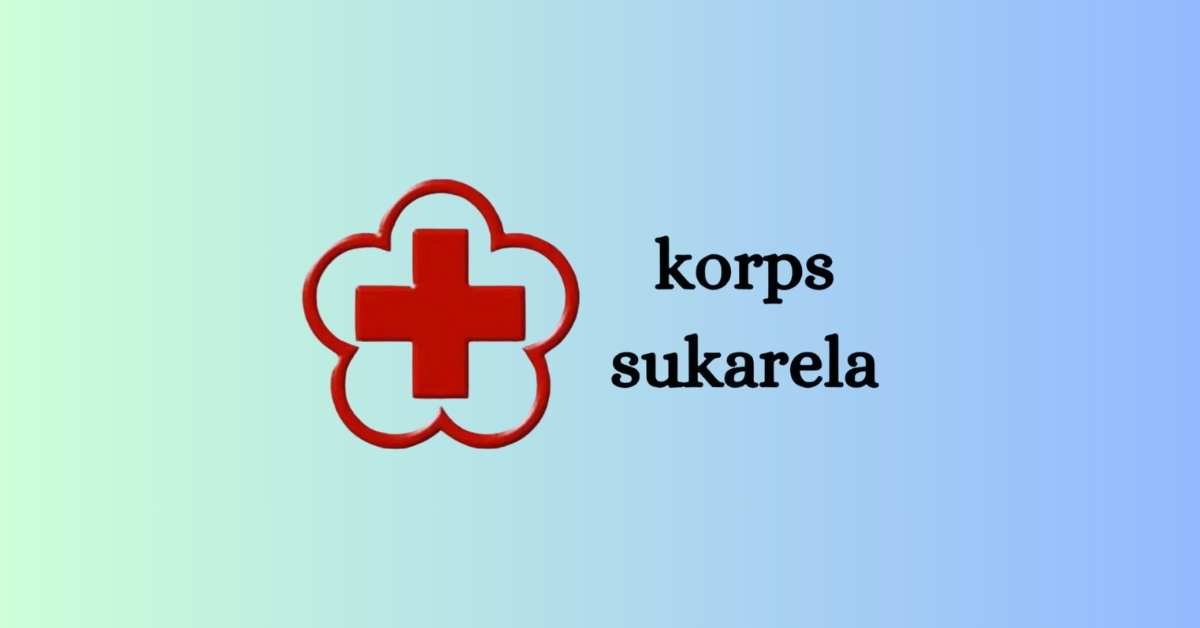In a world where natural disasters, social issues, and humanitarian crises are increasingly prevalent, voluntary organizations play a critical role in providing relief and support. One such organization is the Korps Sukarela, often abbreviated as KSR. This voluntary corps is committed to serving communities through various initiatives, ranging from disaster relief to educational programs. In this article, we will explore the history, mission, activities, and impact of Korps Sukarela, as well as why it holds such a vital position in society.
What is Korps Sukarela?
Understanding the Concept of Korps Sukarela
Korps Sukarela, or KSR, translates to “Voluntary Corps” in English. This organization is made up of volunteers who dedicate their time, skills, and energy to humanitarian causes. Unlike professional emergency responders, members of KSR are often everyday citizens who have received training to assist in various capacities during emergencies and community service activities. The essence of Korps Sukarela lies in its commitment to helping others without expecting anything in return, embodying the true spirit of volunteerism.
The Origins and History of Korps Sukarela
The concept of Korps Sukarela has roots in the broader tradition of voluntary service, which has been an integral part of societies around the world for centuries. However, the formal establishment of KSR as an organized entity often occurs within the context of national or regional needs for structured volunteer efforts. Many KSR organizations were formed in response to specific challenges, such as natural disasters, wars, or social upheavals, where the need for coordinated volunteer efforts became evident.
In some countries, KSR units were initially part of larger humanitarian organizations like the Red Cross or similar entities, which later evolved into independent or semi-autonomous bodies focusing on localized volunteer services. The history of KSR is thus intertwined with the broader history of humanitarianism and community service.
The Mission and Objectives of Korps Sukarela
Promoting Humanitarian Values
One of the core missions of Korps Sukarela is to promote humanitarian values. This includes fostering a culture of empathy, solidarity, and mutual assistance within communities. KSR volunteers are often motivated by a desire to help others, and the organization provides them with the tools and training necessary to translate these values into effective action.
Disaster Relief and Emergency Response
Disaster relief is one of the primary activities of Korps Sukarela. In times of natural disasters such as earthquakes, floods, and tsunamis, KSR volunteers are often among the first to respond. Their tasks may include rescuing survivors, providing first aid, distributing food and water, and helping with the logistics of shelter and evacuation. The ability of KSR to mobilize quickly and efficiently during crises is a testament to the training and preparedness of its members.
Community Development and Educational Programs
Beyond emergency response, Korps Sukarela is also involved in long-term community development and educational programs. These initiatives aim to improve the overall well-being of communities, particularly in underserved or vulnerable areas. Educational programs may focus on health awareness, disaster preparedness, vocational training, and literacy, among other topics. By empowering individuals with knowledge and skills, KSR helps to build more resilient communities.
Health and Medical Services
Health and medical services are another key area of focus for Korps Sukarela. This can include organizing blood donation drives, offering free medical check-ups, and providing health education to prevent the spread of diseases. In some cases, KSR volunteers may also assist in running temporary clinics during emergencies or in areas where medical services are otherwise unavailable.
Environmental Conservation
Korps Sukarela also plays a role in environmental conservation efforts. This includes organizing tree planting campaigns, cleaning up polluted areas, and raising awareness about environmental issues. By engaging in these activities, KSR helps to protect natural resources and promote sustainable practices within communities.
Read Next: Symley: The Impact and Significance of a Simple Symbol
The Structure and Organization of Korps Sukarela
Organizational Hierarchy and Leadership
Korps Sukarela typically operates under a structured hierarchy that ensures efficient coordination and management of its activities. At the top of the hierarchy is usually a board of directors or a central committee responsible for setting the strategic direction of the organization. This leadership group is often composed of experienced volunteers and professionals with a background in humanitarian work.
Beneath the central leadership, there are regional or local chapters of KSR that operate more autonomously. These chapters are responsible for organizing and implementing activities within their specific areas, while still aligning with the broader goals and objectives of the organization. The local chapters are often led by coordinators who oversee day-to-day operations and ensure that volunteers are properly trained and equipped for their roles.
Membership and Volunteer Recruitment
Membership in Korps Sukarela is typically open to anyone who is willing to commit their time and effort to humanitarian service. Volunteers come from all walks of life, including students, professionals, retirees, and others who share a passion for helping their communities. Recruitment efforts often focus on raising awareness about the importance of volunteerism and the specific impact that KSR has on society.
To become a member, individuals usually go through an application process that may include interviews, background checks, and training sessions. This process ensures that volunteers are not only committed but also capable of handling the responsibilities that come with being a part of KSR.
Training and Capacity Building
Training is a vital part of Korps Sukarela’s operations. Volunteers undergo comprehensive training in areas such as first aid, disaster response, conflict resolution, and community engagement. This ensures they are well-equipped with the necessary skills to perform their duties effectively, whether responding to emergencies or participating in regular community service.
In addition to initial training, KSR often organizes regular workshops and seminars to keep volunteers updated on the latest techniques and best practices in humanitarian work. This ongoing capacity building helps to maintain a high standard of service within the organization.
The Impact of Korps Sukarela on Communities
Case Studies of Successful Interventions
The impact of Korps Sukarela can be seen in countless communities where the organization has made a tangible difference. For instance, in the aftermath of a major earthquake, KSR volunteers may have been instrumental in saving lives, providing medical care, and helping displaced families rebuild their homes. These success stories highlight the effectiveness of KSR’s approach to disaster relief and community support.
In another example, a KSR chapter might have launched a successful literacy program in a rural area, significantly improving the education levels of the local population. By sharing these case studies, we can better understand the real-world impact that Korps Sukarela has on society.
Testimonials from Beneficiaries
Hearing directly from those who have benefited from KSR’s efforts provides powerful insights into the organization’s impact. Beneficiaries often express gratitude for the timely assistance and ongoing support provided by KSR volunteers. Whether it’s a family who received help during a flood or a community that gained access to clean water through a KSR initiative, these testimonials underscore the importance of the organization’s work.
Long-Term Benefits for Communities
While the immediate impact of Korps Sukarela’s activities is often evident, the long-term benefits can be even more significant. By building stronger, more resilient communities, KSR helps to reduce the vulnerability of these populations to future crises. Educational programs, in particular, can have a lasting effect by empowering individuals with the knowledge and skills needed to improve their own lives and contribute to the well-being of their communities.
Read Also: Kase Abusharkh Amy Berry: A Fusion of Creative Talents
Challenges Faced by Korps Sukarela
Funding and Resource Constraints
Like many voluntary organizations, Korps Sukarela faces challenges related to funding and resources. While volunteers provide their time and labor for free, there are still costs associated with training, equipment, transportation, and other operational needs. Securing sufficient funding can be an ongoing struggle, particularly in regions where resources are limited.
Volunteer Retention and Motivation
Maintaining a motivated and committed volunteer base is another challenge for KSR. Volunteers may face burnout, especially after participating in intense relief efforts or dealing with emotionally taxing situations. Additionally, life circumstances such as family obligations can make it difficult for volunteers to maintain their level of involvement. KSR must continuously find ways to keep volunteers engaged and motivated.
Navigating Bureaucratic and Logistical Hurdles
Operating in the field of humanitarian work often involves navigating complex bureaucratic and logistical challenges. This can include dealing with government regulations, securing permits, and coordinating with other organizations. These hurdles can slow down KSR’s response time and make it more difficult to implement initiatives effectively.
The Future of Korps Sukarela
Expanding Reach and Impact
Looking ahead, Korps Sukarela aims to expand its reach and impact. This may involve establishing new chapters in underserved areas, launching additional programs, and increasing the number of volunteers. By broadening its scope, KSR can bring its services to more communities in need and address a wider range of issues.
Embracing Technology and Innovation
As technology continues to advance, Korps Sukarela has the opportunity to leverage new tools and platforms to enhance its operations. This could include using social media for recruitment and awareness campaigns, implementing digital platforms for training and coordination, and adopting innovative solutions for disaster response and community engagement.
Strengthening Partnerships and Collaborations
Collaboration with other organizations, both within and outside the humanitarian sector, can help Korps Sukarela achieve its goals more effectively. By partnering with government agencies, NGOs, and private sector entities, KSR can pool resources, share knowledge, and coordinate efforts to maximize its impact. Strengthening these partnerships will be key to the organization’s future success.
Continuing Education and Capacity Building
As the challenges facing communities continue to evolve, so too must the skills and knowledge of KSR volunteers. Ongoing education and capacity building will be essential to ensure that volunteers are prepared to meet new and emerging needs. This may involve expanding the scope of training programs. They offer advanced certifications, and creating opportunities for volunteers to gain experience in different areas of humanitarian work.
How to Get Involved with Korps Sukarela
Joining as a Volunteer
If you’re inspired by the work of Korps Sukarela and want to get involved, there are several ways to do so. One of the most direct ways to do this is to join as a volunteer. This typically involves submitting an application, attending an orientation session, and completing the required training. Once you’re officially part of KSR, you can begin participating in various activities and initiatives, making a tangible difference in the lives of others.
Supporting Through Donations
For those who may not have the time to volunteer but still want to contribute, making a donation is another way to support Korps Sukarela. Donations help to cover the costs of training, equipment, and other operational needs, ensuring that KSR can continue its vital work. Many KSR organizations accept donations online, making it easy for individuals to contribute.
Partnering with Korps Sukarela
Organizations and businesses can also get involved by partnering with Korps Sukarela. This can take the form of financial support, in-kind donations, or collaborative projects. By partnering with KSR, organizations can demonstrate their commitment to social responsibility while also contributing to meaningful change in their communities.
Conclusion
Korps Sukarela is more than just a voluntary organization—it is a lifeline for communities in need. Through its dedication to humanitarian values, disaster relief, community development, and more, KSR has made a lasting impact on countless lives. Despite the challenges it faces, the organization continues to grow and evolve, driven by the passion and commitment of its volunteers.
Whether you’re looking to volunteer, donate, or partner with KSR, there are many ways to support this vital work. As we look to the future, Korps Sukarela will undoubtedly continue to play a crucial role in building stronger, more resilient communities around the world.








